


The article gently addresses the key risk factors associated with coronary artery disease (CAD), highlighting the importance of being aware of and managing these factors. It identifies ten significant contributors:
By emphasizing these risks, the article advocates for proactive lifestyle changes and personalized medical care, reassuring readers that taking these steps can effectively mitigate these risks.
Are you concerned about your heart health? Understanding these factors is the first step towards a healthier life. By making informed choices and seeking support, you can take charge of your well-being. Remember, you are not alone in this journey; there are resources and people ready to help you every step of the way.
Understanding the nuances of coronary artery disease (CAD) is crucial in a world where heart health remains a growing concern. Many of us may feel overwhelmed by the complexities of prevention and management, especially with various risk factors that range from lifestyle choices to genetic predispositions. This article explores ten critical risk factors for CAD, emphasizing how awareness and proactive measures can significantly enhance heart health. What if recognizing these factors could empower you to take charge of your cardiovascular well-being and reduce your risk of life-threatening conditions? Together, we can navigate this journey towards better health.
At Amavita Heart and Vascular Health, we understand that facing coronary artery conditions can be daunting. That’s why we proudly offer cutting-edge therapies that focus on your comfort and well-being. Our minimally invasive techniques, such as cardiac catheterization and heart valve repair, are designed to significantly reduce recovery times, allowing you to return to your daily life more swiftly.
We believe in the power of personalized treatment plans. Each patient is unique, and our dedicated team ensures that your care is tailored to your specific circumstances. This individualized approach not only addresses your immediate medical needs but also fosters long-term well-being, ultimately leading to a better quality of life.
Our cardiologists emphasize that successful outcomes from these innovative procedures validate their effectiveness. Many patients have found them to be a preferred choice for advanced cardiovascular care. We invite you to reach out and explore how we can support you on your journey to better heart health.
Elevated cholesterol levels can significantly contribute to the formation of plaques in the arteries, potentially leading to coronary artery conditions (CAD). It’s important to recognize that many individuals may be unaware of their cholesterol levels, as high cholesterol often shows no symptoms. Regular screening is essential to stay informed about your health. To manage cholesterol effectively, embracing a heart-healthy diet filled with fruits, vegetables, whole grains, and healthy fats is crucial. Research indicates that incorporating foods rich in soluble fiber, such as oatmeal and berries, can help lower LDL (bad) cholesterol levels, thereby reducing the risk of cardiovascular issues.
In addition to dietary changes, regular physical activity is vital for maintaining healthy cholesterol levels. Engaging in moderate exercise for at least 150 minutes each week can help elevate HDL (good) cholesterol while decreasing LDL cholesterol. Experts emphasize that lifestyle modifications often serve as the first line of defense against high cholesterol and coronary artery disease risk factors.
While lifestyle changes are paramount, some individuals—especially those at high risk, such as patients with diabetes, hypertension, or a family history of heart disease—may need more targeted interventions to manage coronary artery disease risk factors. At Amavita Heart and Vascular Wellness, we offer advanced imaging capabilities and comprehensive evaluations to effectively assess and monitor your cardiovascular well-being. This personalized approach ensures that treatment plans are tailored to your individual wellness profile, addressing specific concerns and optimizing outcomes.
Though some individuals may require medications to achieve optimal cholesterol levels, recent studies have raised questions about the effectiveness of certain cholesterol-lowering drugs. These findings suggest that they may not significantly reduce the risk of heart attacks or strokes for everyone. This highlights the importance of personalized treatment strategies that consider individual wellness profiles and preferences.
Overall, a proactive approach that combines dietary changes, consistent exercise, and, when necessary, medication can effectively regulate cholesterol levels and lower the chances of developing coronary artery disease risk factors. Staying informed about the latest studies and professional advice is crucial for making empowered choices regarding your cardiovascular health. Remember, you are not alone in this journey; we are here to support you every step of the way.

Elevated blood pressure, commonly known as hypertension, can significantly increase the stress on your cardiovascular system and blood vessels, raising the risk of coronary artery disease. It’s crucial to manage hypertension effectively, and regular monitoring is an important first step. Making lifestyle changes plays a vital role in managing blood pressure; this includes:
Have you considered how small, consistent changes can lead to substantial improvements in managing your blood pressure? For instance, adopting a heart-healthy diet rich in fruits, vegetables, and whole grains can make a significant difference. Furthermore, engaging in regular physical activity—even in gentle forms like walking—can improve cardiovascular health and help reduce blood pressure.
Dr. David B. Ryder reminds us, "High blood pressure is a silent killer. It can strike without warning, but with proper care and lifestyle changes, it can be controlled." This statement underscores the importance of proactive management. Sometimes, lifestyle changes alone may not be enough, and medication might be necessary for optimal blood pressure control. The latest guidelines from the American Heart Association, specifically the 2025 High Blood Pressure Guideline, recommend a comprehensive approach that includes both lifestyle modifications and pharmacological interventions when needed. By understanding and addressing hypertension early on, you can significantly lower your chances of coronary artery issues and improve your overall cardiovascular health.
Moreover, participating in community initiatives like World Hypertension Day can raise awareness and encourage regular check-ups, helping you monitor your blood pressure effectively. Remember, you are not alone in this journey; support is available, and taking these steps can lead to a healthier, happier life.
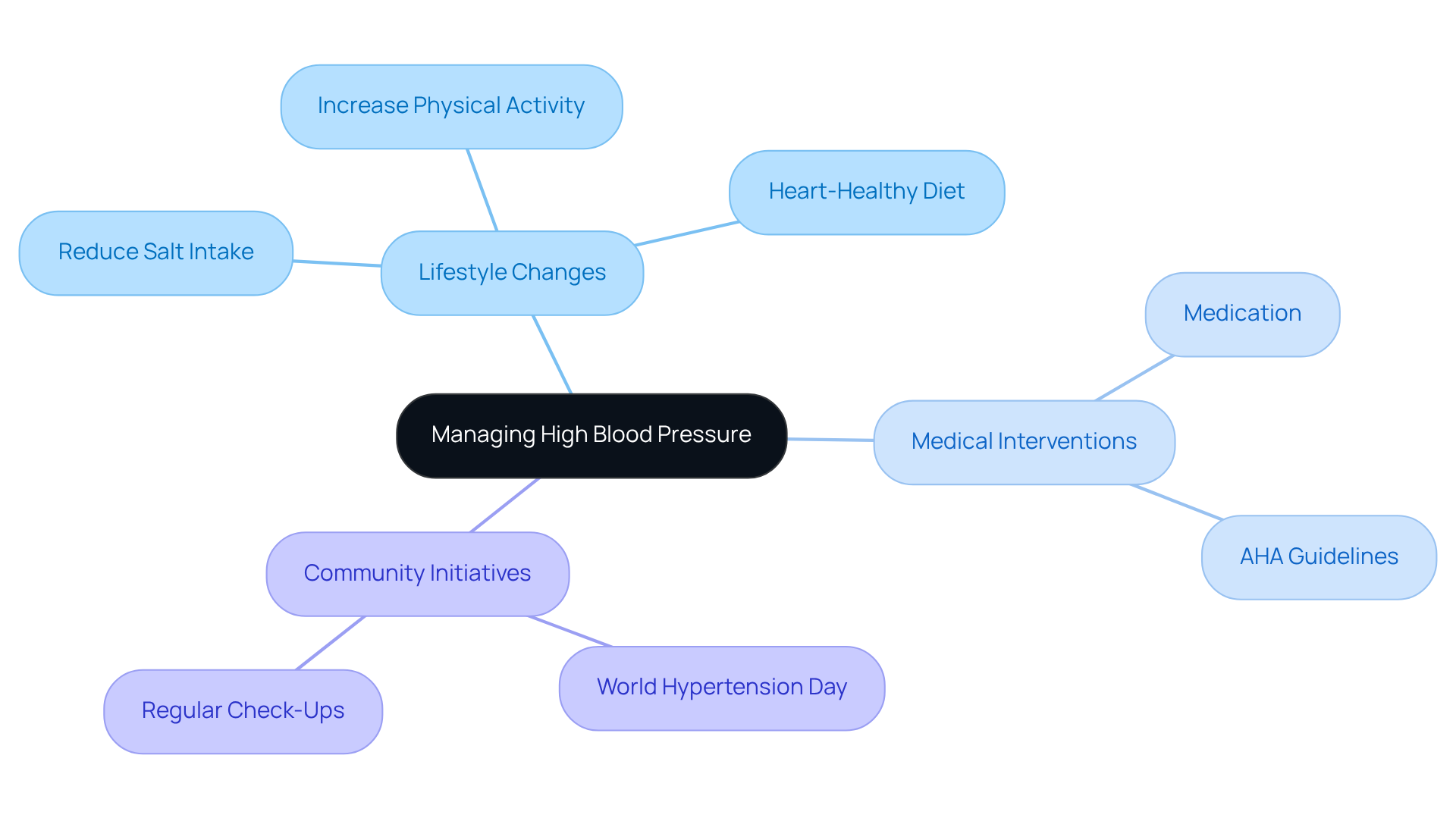
Cigarette smoking can significantly increase coronary artery disease risk factors by damaging blood vessels and reducing the oxygen in your blood. This can be concerning, especially if you are worried about your heart health. However, there is hope. Stopping smoking can greatly improve your heart health and lower the chances of developing heart conditions.
In addition to this, there are numerous support programs and resources available to help you on your journey to quit smoking. These programs are designed with your needs in mind, providing the guidance and encouragement you deserve. Remember, you are not alone in this; many have walked this path and found success.
If you feel anxious or hesitant about taking this step, know that reaching out for support is a brave and important action. Your health matters, and there are caring individuals ready to assist you. Please consider taking that first step towards a healthier you.
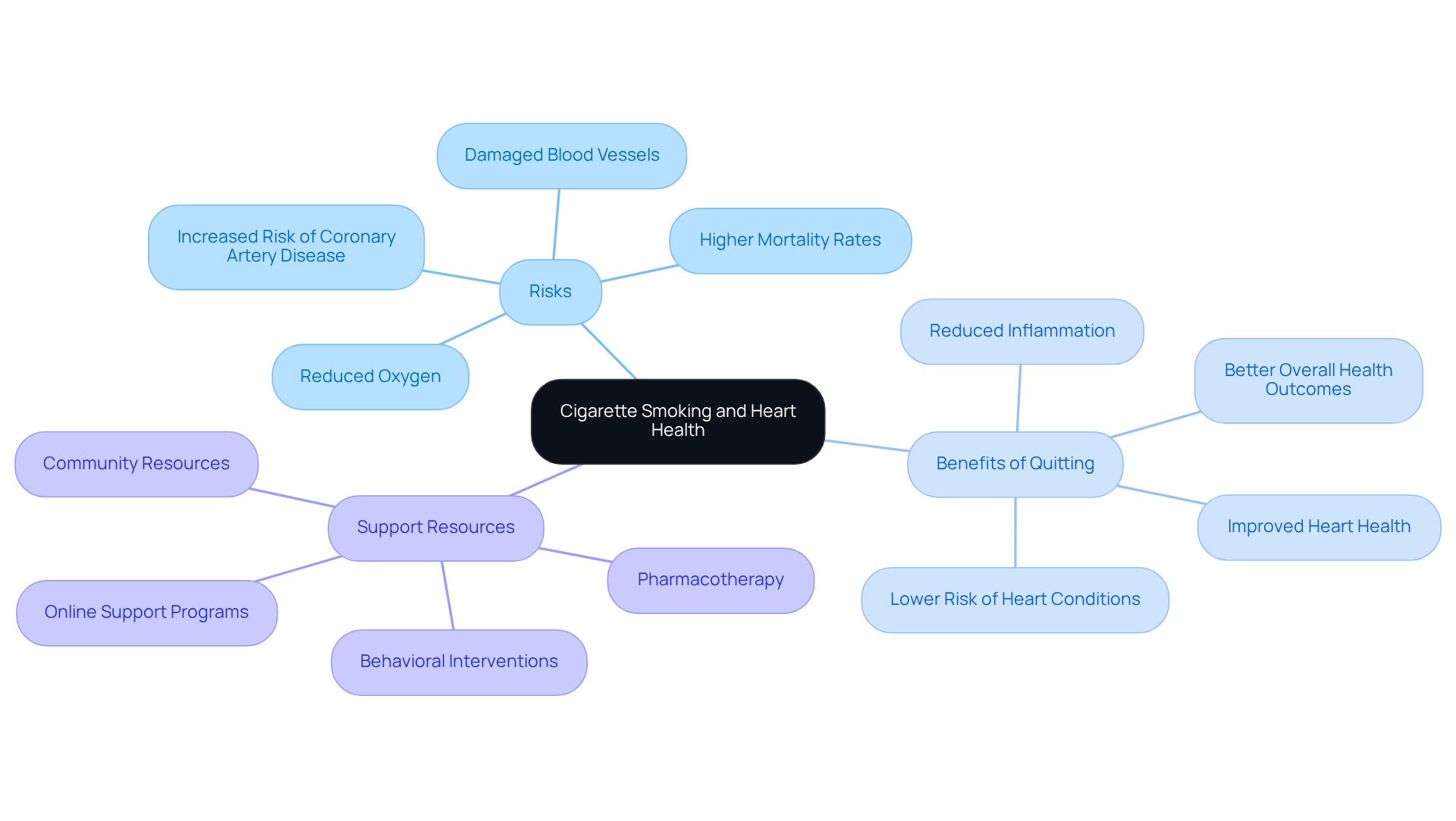
Diabetes mellitus significantly increases the likelihood of coronary artery issues, impacting around 38.4 million individuals in the U.S., which constitutes 11.6% of the population. Extended elevated blood sugar levels can result in vascular damage over time, making effective diabetes management crucial for reducing cardiovascular challenges. It’s important to know that maintaining optimal blood sugar control not only improves diabetes outcomes but also plays a vital role in preventing coronary artery disease risk factors. This involves:
At Amavita Heart and Vascular Health®, we truly recognize the importance of a comprehensive approach to cardiac care. Our CardioElite™ program combines advanced risk evaluation tools and customized interventions, ensuring that patients receive tailored strategies to significantly lower their risk of heart attacks. For instance, personalized treatment plans often include:
Frequent discussions with medical professionals are essential for tracking blood sugar levels and overall cardiovascular well-being.
Moreover, with 8.7 million individuals undiagnosed with diabetes, accounting for 22.8% of adults with the condition, it is essential to prioritize diabetes management to improve cardiovascular well-being and decrease the chance of serious complications associated with coronary artery disease risk factors. To take actionable steps, patients are encouraged to:
By combining effective diabetes management with the comprehensive cardiac evaluations offered through our CardioElite™ program, we aim to transform cardiac care and improve outcomes for our patients.
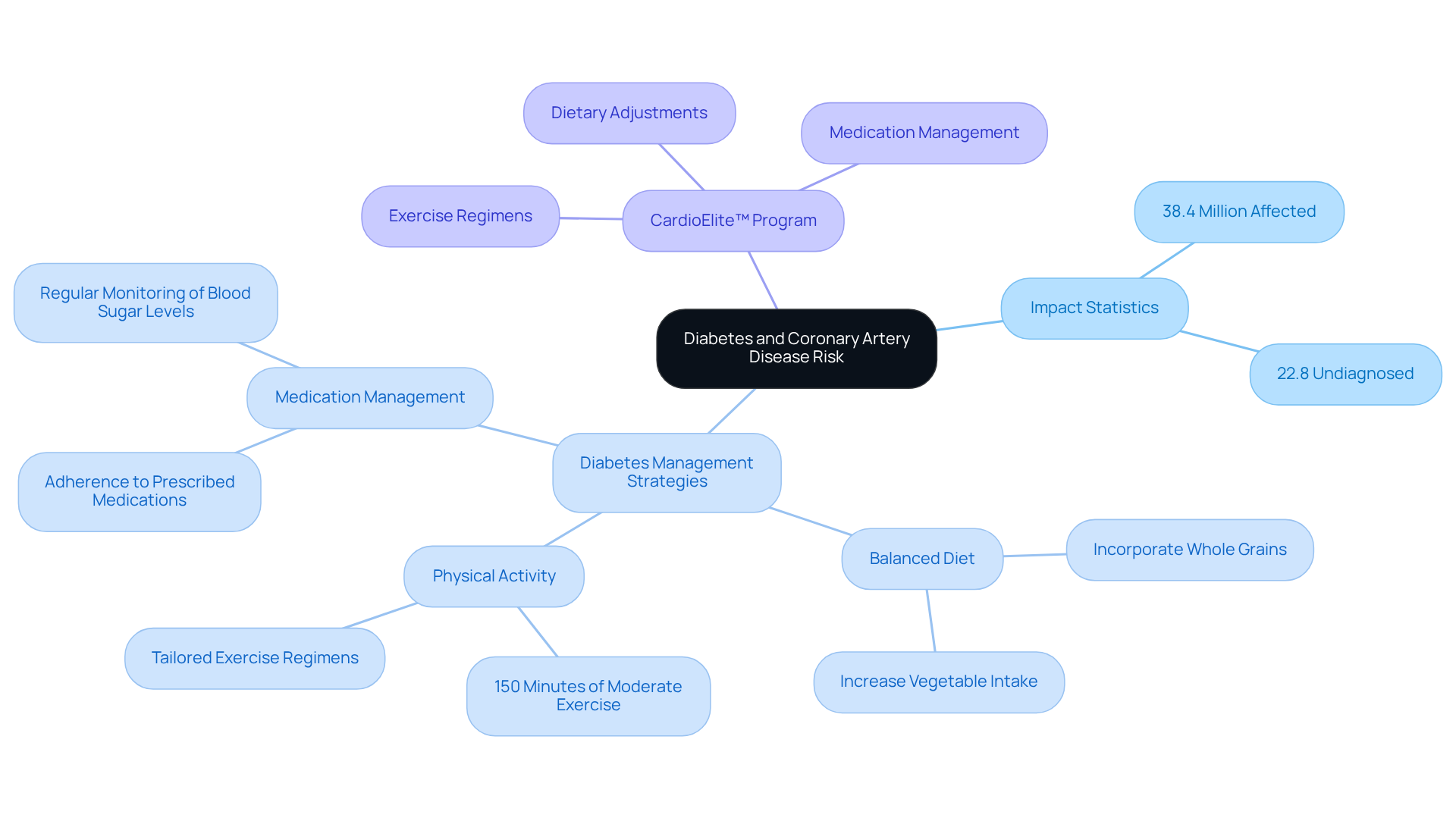
Obesity significantly raises the risk factors for coronary artery disease, largely due to its links with high blood pressure, elevated cholesterol levels, and diabetes. It's understandable to feel concerned about these risks, but studies show that maintaining a healthy weight is crucial for reducing them. Balanced nutrition, such as diets like the Mediterranean and DASH, along with regular physical activity, plays a vital role in supporting cardiovascular health.
Have you considered participating in organized weight loss programs? Research indicates that these can be very effective in reducing cardiovascular issues. Even a modest weight loss can lead to meaningful improvements in heart health. Furthermore, the support of healthcare professionals is invaluable; they can offer personalized guidance and resources to help you achieve and maintain a healthy weight.
This comprehensive approach not only enhances your overall well-being but also significantly decreases the chances of encountering coronary artery disease risk factors. It's a vital consideration, especially for older adults who want to improve their heart health. Remember, you are not alone in this journey, and there are many resources available to help you feel supported and empowered.
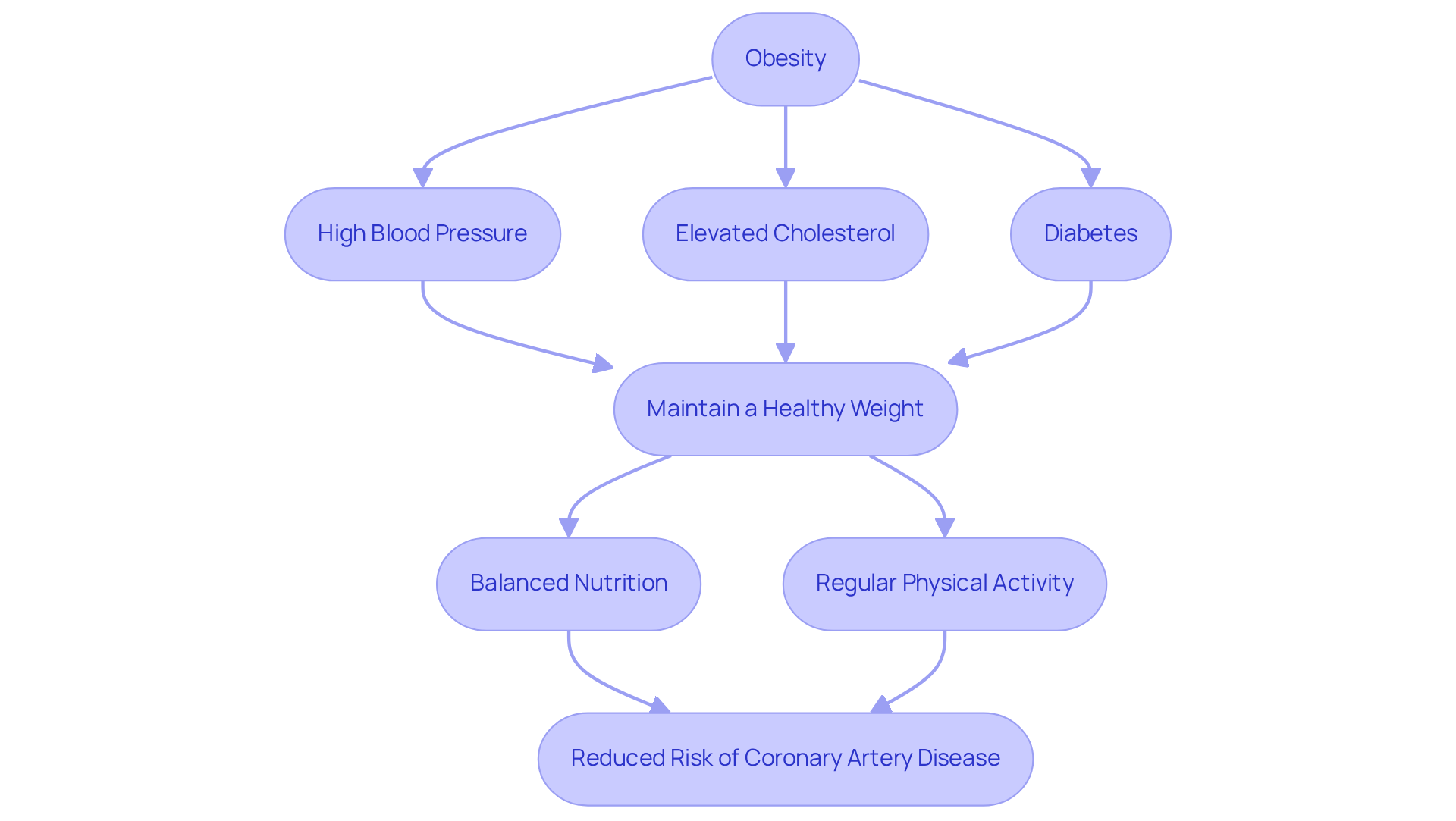
A sedentary lifestyle significantly increases the risk factors for coronary artery disease, making it essential for older adults to prioritize physical activity. Regular exercise not only aids in maintaining a healthy weight but also helps lower blood pressure, improve cholesterol levels, and reduce coronary artery disease risk factors. At Amavita Heart and Vascular Health®, we understand that comprehensive cardiac assessments are vital for identifying coronary artery disease risk factors and developing tailored preventive strategies to meet individual needs.
The 2018 physical activity guidelines suggest that older adults engage in at least 150 to 300 minutes of moderate-intensity exercise each week. This can include enjoyable activities such as walking, swimming, or participating in group classes, which enhance adherence and help make exercise a sustainable part of daily life. Have you considered how meeting the minimum recommendations for moderate and vigorous activity can lower your risk of cardiovascular illness mortality by 22% to 31%? Moreover, fitness specialists emphasize that incorporating both moderate and intense activities can lead to even greater health benefits. Research shows that exercising two to four times above the minimum vigorous activity guidelines can significantly reduce the risk of mortality from cardiovascular issues.
Effective exercise programs designed for older patients with cardiovascular concerns often include community resources and support systems, such as local walking groups and fitness classes. These initiatives foster a culture of regular physical activity. By prioritizing exercise and embracing our preventive cardiology approach, older adults can greatly enhance their heart health and overall quality of life. Consider joining a local walking group or community fitness program to stay active and socially engaged. Remember, you are not alone on this journey; support is available every step of the way.
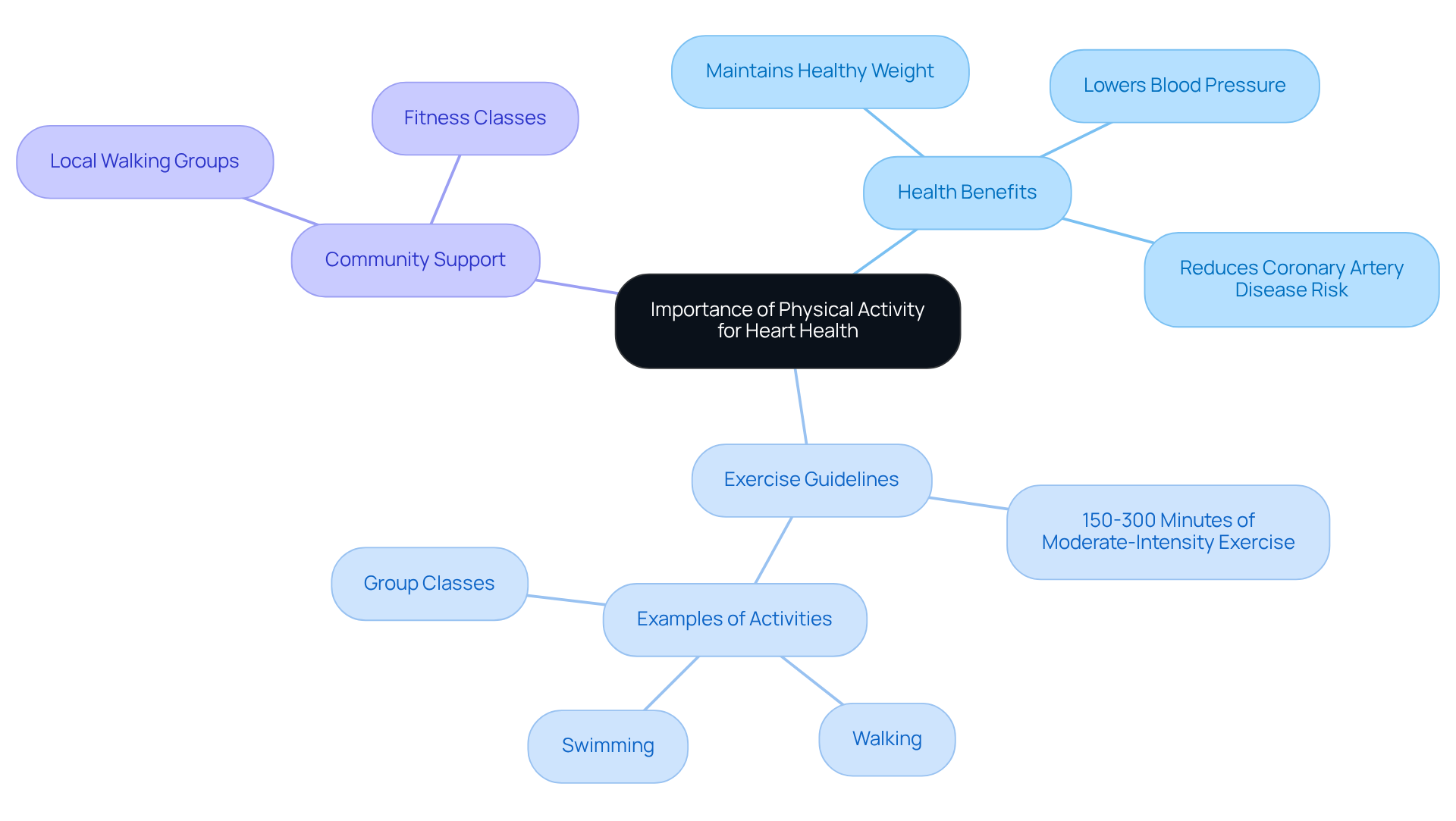
Metabolic syndrome is a condition that can raise significant concerns for many individuals. It is characterized by a combination of issues, such as high blood pressure, high blood sugar, excess body fat around the waist, and abnormal cholesterol levels. Understanding the coronary artery disease risk factors is crucial, as they greatly increase the risk of coronary artery conditions. At Amavita Heart and Vascular Health, we truly care about your health and recognize that managing metabolic syndrome requires a comprehensive approach tailored to your needs.
Our CardioElite™ program is designed with you in mind, offering advanced imaging and personalized evaluations. This ensures that high-risk patients receive the targeted cardiovascular care they deserve. We know that lifestyle modifications, such as improved nutrition and increased physical activity, are essential for managing metabolic syndrome and minimizing coronary artery disease risk factors. However, these changes are most effective when supported by proactive, data-driven care.
By incorporating advanced diagnostic tools and ongoing monitoring, we strive to enhance your health outcomes and lower the coronary artery disease risk factors. Remember, you are not alone in this journey. We are here to support you every step of the way, ensuring that you feel empowered and cared for as you take charge of your health.
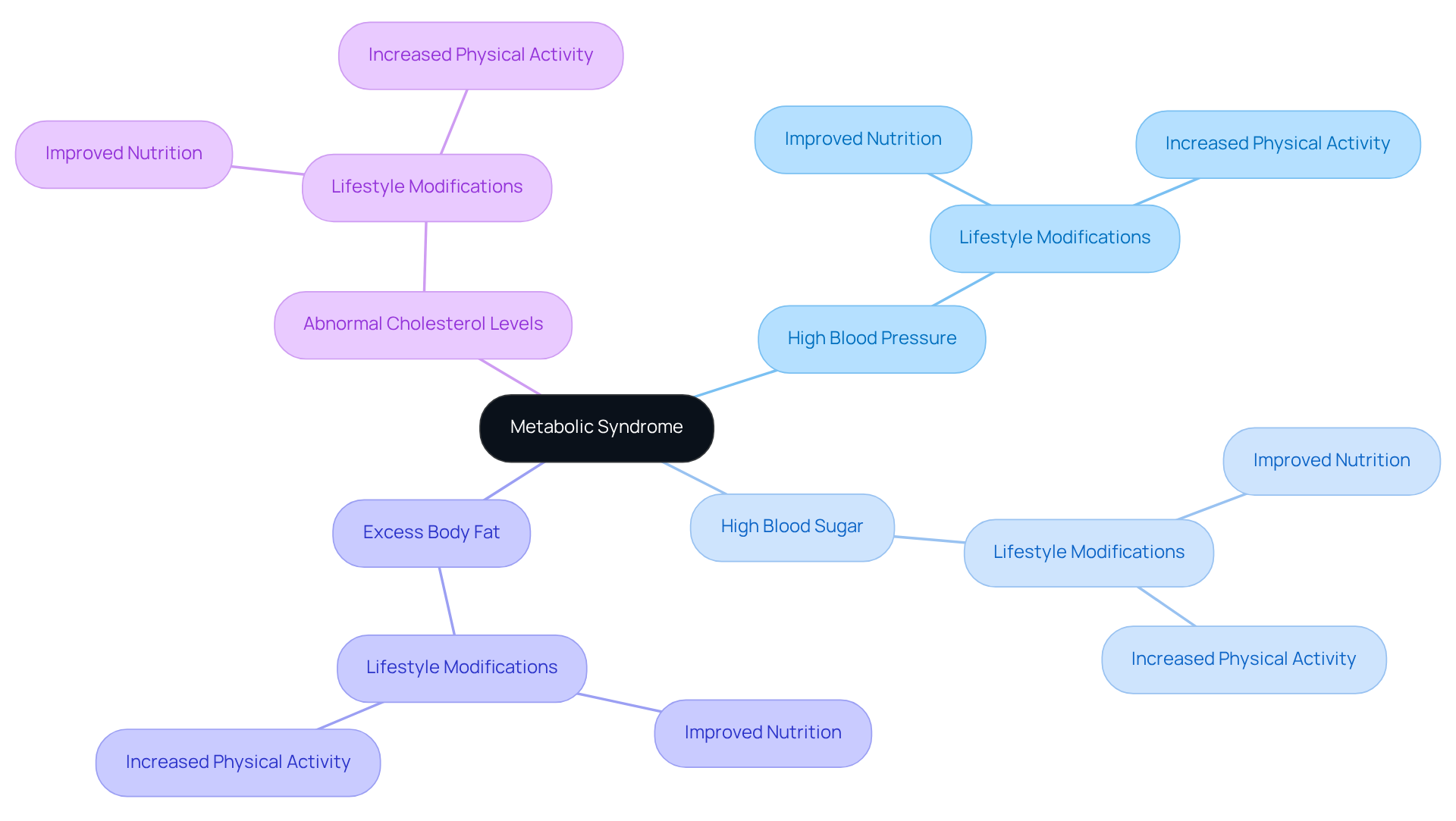
Mental stress and depression are significant yet often overlooked contributors to coronary artery disease. Have you ever considered how persistent stress might affect your heart health? Studies suggest that ongoing stress can lead to inflammation and metabolic irregularities, which are detrimental to cardiovascular well-being. Thankfully, effective stress management techniques, such as:
can significantly reduce these risks. Engaging in mindfulness meditation has been shown to lessen anxiety and enhance overall mental wellness, while physical activity not only boosts cardiovascular fitness but also diminishes stress levels.
It is essential for patients, particularly the elderly, to openly discuss their mental well-being with healthcare professionals. This conversation ensures a comprehensive approach to care, addressing both physical and psychological aspects of health. With roughly 23% of American adults experiencing mental wellness conditions in the past year and about 75% of Americans reporting physical or psychological symptoms of stress in the last month, the prevalence of stress-related issues among the elderly is especially concerning. As stress can exacerbate existing medical conditions, integrating mental wellness support into cardiovascular care is crucial for improving patient outcomes.
Psychologists emphasize that managing stress is not just about eliminating it but about adopting effective coping strategies. As William James wisely noted, "The greatest weapon against stress is our ability to choose one thought over another." This perspective underscores the importance of mindset in managing stress and its impact on heart health. By prioritizing mental health, patients can take proactive steps to lower their risk of coronary artery issues. Remember, you are not alone in this journey; support is available, and taking action can lead to a healthier future.

Genetics and family background are essential factors in understanding an individual's risk for coronary artery conditions (CAD). If you have a family history of cardiovascular issues, it’s natural to feel concerned. This background often indicates a higher risk, which can lead to the need for earlier screenings and proactive steps to safeguard your health.
It's important to know that if you have a genetic predisposition to cardiovascular problems, discussing this with your healthcare provider can help tailor a personalized approach to managing your vascular health. This collaborative effort not only raises awareness but also empowers you to take control of your heart health, potentially minimizing the impact of genetic factors.
Recent studies underscore the value of family history in cardiovascular assessments. They reveal that identifying at-risk individuals early can significantly improve health outcomes. Geneticists stress the importance of understanding your family background, as it can shape screening protocols and guide lifestyle changes aimed at lowering the coronary artery disease risk factors.
By prioritizing these discussions with your medical team, you can navigate your cardiovascular health journey more effectively. Remember, you are not alone in this; support is available, and taking these steps can lead to a healthier future.
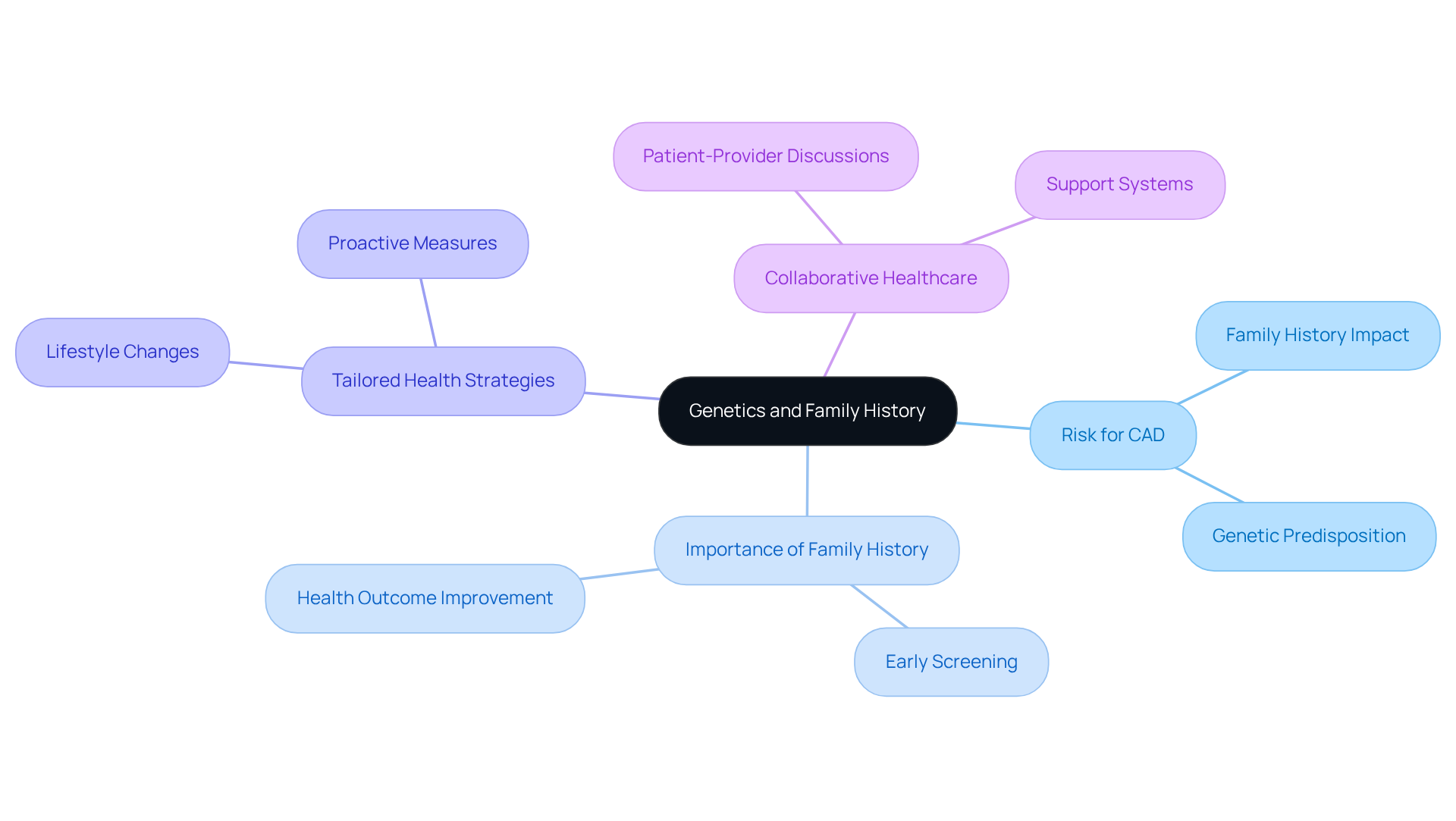
Understanding the various risk factors for coronary artery disease (CAD) is essential for maintaining heart health and preventing serious complications. This article has highlighted ten key contributors, including lifestyle choices such as diet and exercise, genetic predispositions, and mental health issues. Each factor significantly impacts the overall risk profile for CAD, underscoring the need for a comprehensive approach to heart health.
Key insights include:
Personalized treatment plans and proactive lifestyle changes are crucial for effectively addressing these risk factors and enhancing overall well-being.
In conclusion, taking charge of your heart health involves not only understanding these risk factors but also actively engaging in preventative measures. Regular check-ups, lifestyle modifications, and open communication with healthcare providers are vital steps in reducing the risk of coronary artery disease. By prioritizing heart health today, you can pave the way for a healthier future, ensuring that you are equipped to manage your cardiovascular risks effectively.
What advanced treatments does Amavita Heart and Vascular Health offer for coronary artery disease?
Amavita Heart and Vascular Health offers advanced treatments including minimally invasive techniques such as cardiac catheterization and heart valve repair, which aim to reduce recovery times and enhance patient comfort.
How does Amavita personalize treatment plans for patients?
Amavita creates personalized treatment plans tailored to each patient's unique circumstances, addressing immediate medical needs while fostering long-term well-being and improving quality of life.
Why is high blood cholesterol a concern for coronary artery disease?
Elevated cholesterol levels can lead to the formation of plaques in the arteries, increasing the risk of coronary artery conditions. Many individuals may be unaware of their cholesterol levels as high cholesterol often has no symptoms.
What lifestyle changes can help manage high cholesterol levels?
Effective management of high cholesterol includes adopting a heart-healthy diet rich in fruits, vegetables, whole grains, and healthy fats, as well as engaging in regular physical activity for at least 150 minutes each week.
What role does high blood pressure play in coronary artery disease?
High blood pressure, or hypertension, increases stress on the cardiovascular system and blood vessels, raising the risk of coronary artery disease. Effective management is crucial for reducing this risk.
What lifestyle modifications can help control high blood pressure?
Lifestyle modifications to manage high blood pressure include reducing salt intake, increasing physical activity, and adopting a heart-healthy diet rich in fruits, vegetables, and whole grains.
When might medication be necessary for managing cholesterol or blood pressure?
Medication may be necessary for individuals at high risk of coronary artery disease, such as those with diabetes, hypertension, or a family history of heart disease, particularly when lifestyle changes alone are insufficient.
How does Amavita support patients in managing their cardiovascular health?
Amavita provides advanced imaging capabilities, comprehensive evaluations, and personalized treatment strategies to effectively assess and monitor cardiovascular well-being, ensuring tailored care for individual wellness profiles.